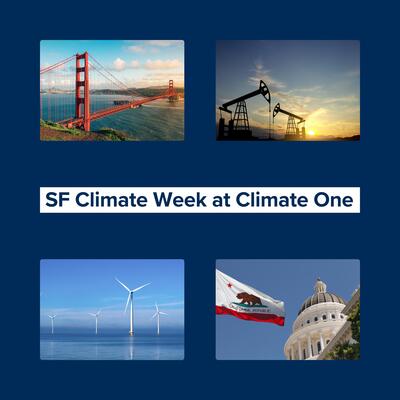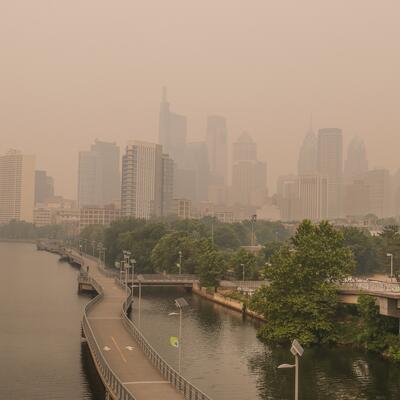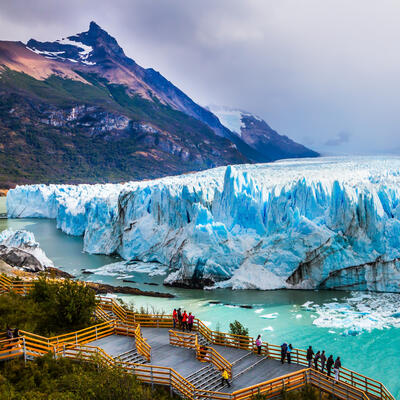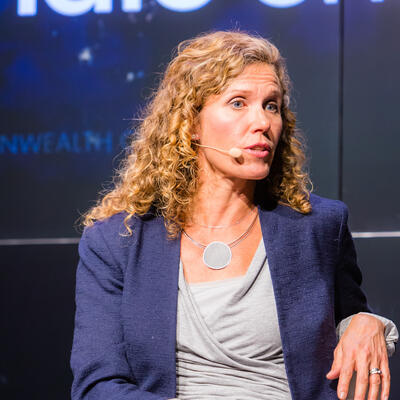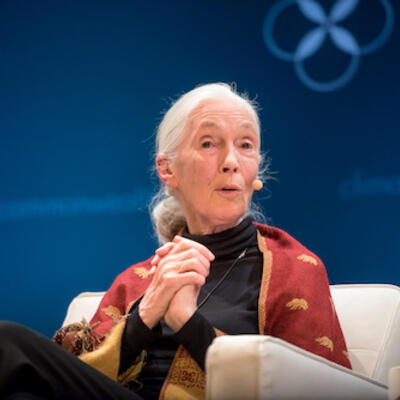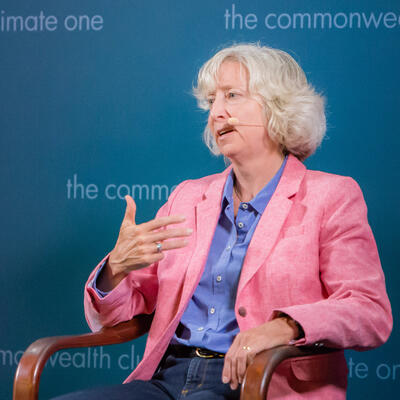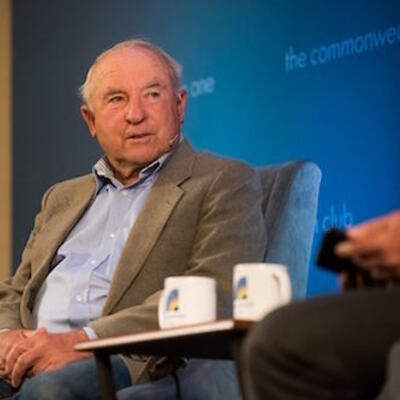
Letters to The Boss: Help Fix Our Climate
Guests
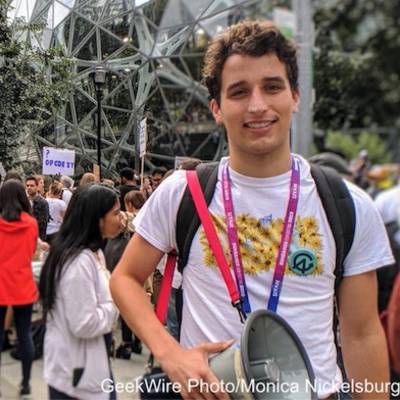
Jacob Adamson

Sara Law
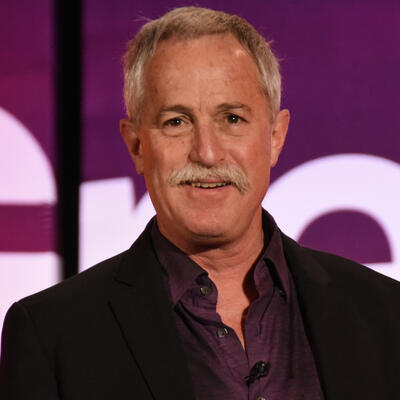
Joel Makower

Sarah Read
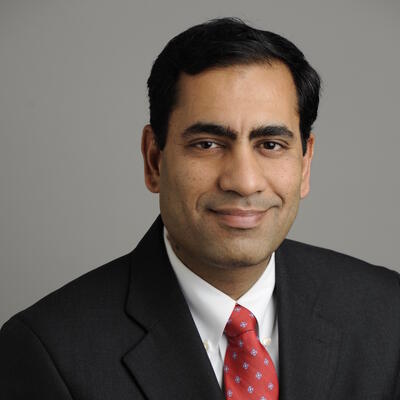
Swami Venkataraman
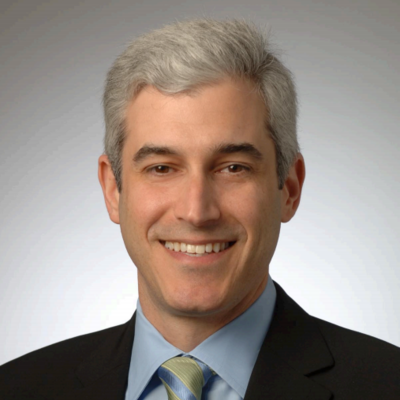
Andrew Winston
Summary
When more than a thousand Amazon employees walked off the job last September, it wasn’t higher wages or better benefits they were demanding.
“It was a really, really powerful moment to see such support for something as radical, I guess as climate change,” remembers Sarah Read, an Amazon User Experience Researcher.
“That was a moment when I realized that we as employees could change what the company was doing,” agrees software designer Jacob Adamson. “Just the mere act of signing a letter could move the largest company, move the richest man in the world, to do something.”
Read and Adamson are both members of Amazon Employees for Climate Justice (AECJ), the group that organized the walkout. Workers in Amazon offices from Seattle to New York to Dublin participated, joined by students, youth groups and tech workers from other companies. It was the culmination of a long-waged employee campaign urging CEO Jeff Bezos and other upper level management to reduce the company’s carbon footprint. (Amazon scored a “C” on the Greenpeace Click Clean Report; tech companies Facebook, Google and Youtube each scored an “A.” Bezos has since pledged to make the company carbon neutral, in line with the Paris Climate Agreement.)
Climate change is becoming a major risk factor for corporations - today, not far in the future. With groups like the Carbon Disclosure Project grading companies on environmental action, employees, consumers and investors are taking note -- and woe to those CEOs who are slow to pick up the ball.
“We’re gonna start to see some efforts where silence is complacency and it’s no longer acceptable,” says Joel Makower of Greenbiz. “You’re gonna have to get off the sidelines, to use the football metaphor, and get into the game one way or the other. And companies that aren’t, I think, are gonna find themselves facing some new pressures.”
Full Transcript
Greg Dalton: This is Climate One, changing the conversation about energy, the economy, and the environment.
CLIP [Amazon Walkout]
Greg Dalton: When Amazon employees walked off the job last September, it wasn’t higher wages or better benefits they were demanding.
Sarah Read: It was a really, really powerful moment to see such support for something as radical I guess as climate change.
Greg Dalton: Climate change is becoming a major risk factor for corporations - today, not far in the future. With groups like the Carbon Disclosure Project grading companies on environmental action, employees, consumers and investors are taking note -- and woe to those CEOs who are slow to pick up the ball.
Joel Makower: We’re gonna start to see some efforts where silence is complacency and it’s no longer acceptable.
Greg Dalton: Letters to the boss - help fix our climate. Up next on Climate One.
---
Greg Dalton: When it comes to corporate climate action, is the customer always right? Climate One conversations feature oil companies and environmentalists, Republicans and Democrats, the exciting and the scary aspects of the climate challenge. I’m Greg Dalton.
CLIP [Amazon Walkout]
Greg Dalton: Last September 20th, more than a thousand Amazon employees walked out of corporate headquarters in Seattle and offices from Los Angeles to Dublin. It was the culmination of a long-waged employee campaign urging CEO Jeff Bezos and other upper level management to reduce the company’s carbon footprint.
Jacob Adamson: That was a moment when I realized that we as employees could change what the company was doing. Just the mere act of signing a letter could move the largest company, move the richest man in the world to do something.
Greg Dalton: Workers at a growing number of companies are pressuring their own CEOs to take a stand on climate change. And the message isn’t just coming from within - many corporations are feeling the heat as consumers and investors hold their feet to the fire, demanding both action and transparency on everything from supply chain to waste disposal.
But does incorporating climate risk into corporate decisions help or hurt business? On today’s program, we’ll hear from experts who are keeping score on how the big players are doing, what they could be doing better, and what it means for their bottom line.
CLIP [Amazon Walkout]
But first, we’ll talk with Amazon employees Sarah Read and Jacob Adamson. Read is a user experience researcher and Adamson is a software developer. They’re both members of Amazon Employees for Climate Justice, or AECJ, the group that organized the September walkout.
In Greenpeace’s 2017 scorecard called Click Clean, Facebook, Google and Youtube all scored an A. Amazon got a passing grade of C - not good enough, say many employees. At their annual shareholder meeting this past May, Amazon user experience designer Emily Cunningham stood up and challenged Jeff Bezos to come out on stage so she could address him directly. Sarah Read was in the room where it happened.
---
Sarah Read: Oh wow, that was a really powerful moment. And when Emily stood up to introduce the resolution, she asked us to stand with her. And so the moment of seeing those employees stand up and support her and her speech was so powerful I mean, I know several of us including myself, cried when she spoke about the next generation and the future of the youth globally. And so, yeah, it was a really, really powerful moment to see such support for something as radical I guess as climate change.
Greg Dalton: Jacob, you were outside the building. What was your take, your experience on that day when the company said it will release its carbon footprint later in 2019. How important was that for you personally, and as a moment for the company?
Jacob Adamson: I think that that was a moment when I realized that we as employees could change what the company was doing. Just the mere act of signing a letter could move the largest company, move the richest man in the world to do something. So that for me was a moment where I felt really empowered. And it was a moment when I realized there’s something going on here.
Greg Dalton: And how about you both personally before you signed the petition or joined Amazon Employees for Climate Justice, did you have a lump in your stomach? How about that moment when you push the button. Tell me about that.
Jacob Adamson: I think that one feeling that I had really strongly the first time I ever did anything related to climate justice at Amazon was nervousness. I was like asked if I could talk to my coworkers about the shareholder letter and about the resolution. And I had never done anything like that, you know, I knew my coworkers but I knew them as people through work. And we talked about what we had done last weekend what are we gonna do next weekend and what we were having for lunch that day. Issues like climate change were not discussed, but I knew that what I was doing was important and that it was the right thing to do. So I pushed through that nervousness. And I also knew that if I couldn’t do it, you know, someone with tremendous privilege and I'm not on a visa I can lose my job and ultimately be okay. And if I can't do that how can I expect other people to do that.
Greg Dalton: So the day before the big walkout there’s a global climate strike September 20th, Greta Thunberg is encouraging students around the world to not go to school, there is the Amazon walkout. What was the mood in the office that day?
Sarah Read: Well, the day before the walkout was the day of the climate pledge that Amazon announced. So while there was excitement from the walkout the questions that I was getting from all of my teammates is, “What do you think about the climate pledge and are we still walking out?” And I said, “The climate pledge is a great first start. And heck yeah, we’re still walking out tomorrow.” So it was an exciting energy.
Greg Dalton: And that's the pledge where Jeff Bezos said, “We’re done being in the middle of the herd on this issue. Decided to use our size and scale to make a difference and pledge to be net zero by 2040, 10 years ahead of the Paris agreement.” So he kind of was clearly moved by the employees. So what was it like on the day of the actual walkout? Here it is, okay this big day and employees are in headquarters and around the country around the world really are walking out. Take us to that day.
Sarah Read: Yeah. That day was so exciting. I went downstairs into the lobby, and I had told of all the people that I had spoken with and emailed with in my building about the walkout. And I'm standing down there in the lobby with my team waiting.
And a few minutes go by, and I'm like oh my gosh no one is coming it’s not gonna happen. I've been doing all this work and then slowly people come out of the elevators two here, two here, another one there. I had a package of stickers and so I’m just handing out stickers to everyone. “Do you want a sticker? Do you want a button? What's your name? Thank you for joining us.” And we all waited until we had a kind of a critical mass of 20, 30 people and we walked out and there's people everywhere and signs and media and pizza. It was so exciting, it was like the most exciting thing that I've ever been a part of to see. And as we stood there and chatted with people and there are more and more buildings joining us at the spheres coming in just like these droves of people it was unlike nothing else.
Greg Dalton: Wow, what a feeling. How about you Jacob, what was the experience like?
Jacob Adamson: I think a lot of it was similar. I was pretty nervous. I was waiting in the lobby also, and, you know, I just got around to everyone's desk that I had talked to already and say, okay are you coming? And they’re like, yes, let me finish like this one last thing. In the lobby I have like maybe four or five people and I’m like oh my God like months of work and this is all I got. But then more people came down, and more people came down. And we had to move out of the lobby into the patio outside because there so many of us. And, turning the corner to see the crowd of people around the spheres was something I’ll never forget. It wasn't just something we’ve been working for, for so long it was here and it was finally happening.
Greg Dalton: Was there ever any retaliation or pressure to not do this or to participate or not participate?
Sarah Read: No. Actually, a lot of employees took time off for the walkout. Just to have the air cover and I think an Amazon official was quoted in one article saying that employees can do whatever they want with their time off. So, you know, we haven't experienced any retaliation, not to say that it will never happen. But, at this moment it has not. And I think part of that is really because we are not being anti-Amazon. We are simply asking Amazon to take ownership over this issue to take ownership over its impacts. And to really live up to the high standards that we’re held to every day on the job.
Greg Dalton: What are the big levers you know, the big sources of emissions is it the trucks you know, a lot of people don't realize how big Amazon Web Services is. Netflix and a lot of the websites in America run on Amazon Web Services, is it the packaging. What are the big levers?
Jacob Adamson: Well, it’s the things you just mentioned. The data centers are big sources of, you know, carbon emissions. So is the massive logistics network all the trucks the vans and everything combined is a carbon footprint the size of a small European country.
Greg Dalton: Sure. Massive. So what do you think about you said that Jeff Bezos plan, the pledge, was a good first step. What else should the company do?
Jacob Adamson: So there's still things that Amazon needs to do to be a leader in the climate movement. Firstly, that Amazon is committed to carbon neutrality. That doesn't mean we’ve actually committed to emissions reduction. We can get our way to carbon neutrality through offsets. And in addition to that we need to stop donating to politicians that don't believe in climate change. Last year alone we donated to 60 such politicians that are now in Congress.
We also shouldn’t be making technology that helps fossil fuel companies get oil and gas out of the ground. It needs to stay on the ground.
Greg Dalton: So you think that Amazon should actually actively not pursue oil and gas which are very sophisticated users of technology. They want to use the cloud and powerful computing to find more oil and gas and get it out of the ground. And you're saying Amazon shouldn't pursue that business.
Sarah Read: No. Amazon should not. A few weeks after they made the climate pledge, Amazon was at a conference actually for oil and gas helping I guess market AWS products to help those customers. The science is clear; we cannot extract any more fossil fuels out of the ground; they have to stay in the ground. And Jeff in his climate pledge said he wants to be a leader in this area but you can't be a leader if we're helping extract fossil fuels that seem so obvious, right? So we think that that's gonna be a really important part of being a leader in this area is stopping soliciting that business from oil and gas.
Greg Dalton: There’s also a pledge for 100,000 Rivian electric delivery vans after Amazon invested in the company. A lot of tech people look to innovation, you know, solutions. What innovative things that or others is the company doing to solve some of the problem?
Jacob Adamson: So one thing that the company has pledged to do is called shipment zero. They're planning on having 50% of packages be delivered in a carbon neutral way. And that is through electric vehicles and sustainable packaging. So that's something that they originally announced in response to the shareholder letter that was sent out months ago. And so that was a direct result of Amazon employees organizing and making their voices heard.
Sarah Read: When it comes to some of the stuff that the climate pledge has introduced and especially those electric vans and electric vehicles. One of the things that we've been talking about that we haven't seen addressed is piloting those electric vehicles and the new solutions for fulfillment centers in communities that are most affected by our pollution.
If you’re aware of the Inland Empire in California which is San Bernardino and Riverside that's a huge warehouse hub. Amazon has warehouses there, people in those communities which are largely communities of color have increased respiratory disease and asthma as a result of all of the pollution around the logistics industry. And so for us it's really important that Amazon actually looks at who is most affected by our carbon emissions and actually start to address those areas first. If they do a lot of stuff for the privileged people it’s not the place to start. We really want to start with the people who are most impacted by our pollution.
Jacob Adamson: Yeah. I would say that those people, you know, working in the warehouses living in the warehouses and drivers. They're not just other random people, these are our coworkers, they are in our internal directory. And their families are getting hurt by the pollution that our company is emitting.
Greg Dalton: So there's no white-collar, blue-collar split in this movement inside the company?
Jacob Adamson: I would say that we’re all on the same planet and we’re all in this together. If we're going to solve climate change if we’re gonna effectively enact climate justice we have to understand that.
Greg Dalton: How has this experience changed each of you as a person? You came into the company, Jacob, was a little more environmental, Sarah, not so much. It’s been a couple of years. How are you as a professional and as a person changed by this experience?
Jacob Adamson: I think that the experience of working for something that matters is a transformative one. When I first had a conversation with my coworkers about climate change I was really nervous. But as I kept having these conversations they got easier and easier and more powerful every time. And in addition to seeing those transformations within myself I've seen them in my other coworkers we can talk about issues that matter, not just carbon emissions but issues of human rights and other and racial justice. The coworker who I spoke to that wouldn’t sign on to the shareholder letter that wouldn't vote yes on the resolution, they joined the walkout.
Greg Dalton: How about you Sarah?
Sarah Read: It's really changed me very quickly. I mean, I've been involved for six, seven months now. I remember a year ago I definitely felt like there were not people at Amazon that cared as deeply about social justice and racial justice as I did and I felt very alone and kind of isolated. And to see this group of people who think like I do and see the world as I do and care about the issues that I care about and to be able to join them and rally around the notion of environmental justice and actually get things done has really made me feel confident in tech workers in Amazon workers in myself. I just feel like a whole new person.
---
Greg Dalton: That was Sarah Read and Jacob Adamson of Amazon Employees for Climate Justice. You’re listening to a Climate One conversation about climate change and corporate culture. Coming up, winning hearts and minds in the boardroom.
Andrew Winston: For almost every CEO I talked to there was a personal reason. Like their kids talked to them, or they went to the rainforest or they went to the Arctic and it took one of these trips; they needed to make it personal. They needed a story.
Greg Dalton: That’s up next, when Climate One continues.
---
Greg Dalton: This is Climate One. I’m Greg Dalton, and we’re talking about corporate responsibility and climate change. My next guests are two experts long on the vanguard of infusing environmental values into corporate America. Joel Makower is Chairman and Executive Editor of Greenbiz, a media group focusing on the intersection of business, technology and sustainability. Andrew Winston is a veteran consultant and author of “Green to Gold: How Smart Companies Use Environmental Strategy to Innovate, Create Value, and Build a Competitive Advantage.”
We’ve been hearing a lot lately about the climate “ambition gap” - the space between what’s needed to cut carbon pollution to safe levels and the action that companies and governments are taking. Joel Makower has some insights.
Joel Makower: Well, first of all I see an inflection point in the conversation about business and climate, which is I think fundamental to what we’re going to talk about for the next few minutes. And it's kind of flipping the script from the traditional conversation about what is business doing to the climate to what is the climate doing to business? And, in a world of you know, fires and floods, and heat waves, and hurricanes and all of that. There is a lot of risk involved; supply chain risk, business continuity risk, right to operate risk, if you're a big water user in a water stressed area. And, so the conversation is really a lot more risk focused than it used to be. And, in some ways the gap, yes, there is an ambition gap and we’ll get to that. But, the gap is between the risk people inside companies and the sustainability people. They don't talk to each other, many don’t even know each other. And when they do talk to each other they often realize that they don't speak the same language, they don't even talk about risk in the same way.
So, I mean fundamental to this ambition gap is sort of this, this new understanding of the relationship between business and climate. And, yes I mean you see I've been doing involved with the aviation industry a lot lately, and if you look at where pretty much every major sector is going based around the Paris Accord, and a lot of other science-based target initiatives. It's getting to net zero carbon by midcentury by 2050. The aviation industry they want to cut their climate emissions in half by 2050. So, that's not gonna work, that's an ambition gap right there, within a sector never mind the actual company operations.
Greg Dalton: One thing on aviation, I've heard from people that flight shaming which is taking off in Europe and kind of coming to the United States is getting the aviation industry interested in a way that it's getting their attention. Because if their product is shameful that's different that's new for them.
Joel Makower: Yeah. It's more than that though, Greg. It's also, yeah, that that's true and particularly in Europe and in Europe it's not just the flight shaming even the German Finance Minister back in September said that it was going to raise the taxes on intra-German flights, and lower the taxes on intra-German train rides in order to -- that’s a existential hit at least within the domestic market.
But, it's also if you talk to for example, corporate sustainability folks, which I do all the time and they’ll say you know we've done so much, the proverbial low hanging fruit. We've done our facilities, and our products, and we’ve work with our supply chains, and we've got you know, we switch to renewables. And we've done a whole range of energy-related and other things within their area of influence. But, flying is been the biggest piece of it that they haven't figured out how to do that. And obviously the best answer is don't fly. And for some reason companies haven't figured out that that's I mean they haven’t found good viable options. Telepresence was going to change all that and it hasn't really, you can do some things with telepresence, but not a lot people still want to press the flesh. So, I think there's a lot of risk in the corporates more so than individual travelers saying we have to cut back our flying and that becomes a big, big, risk for the aviation sector.
Greg Dalton: Andrew Winston, sustainability's often been kind of in a green box sort of as Joel mentions sort of the sustainability people are not the kind of the heavy hitters. It’s not always the CFOs, the people who are working on risk or capital allocation, is that changing? You recently wrote about a survey of a thousand CEOs at Accenture that the UN Global Compact did what do that study find?
Andrew Winston: Yeah, it’s interesting. I want to build on a couple things Joel said if that's okay? You know, so I think this risk cycle is really interesting, because you know, we started maybe 40 years ago where risk from a company perspective was just regulation, right. I have this kind of narrow definition, and then over years we move to, oh, we can reduce cost we can innovate and create new products, we can you know, create value in other ways. And I agree that we’re kind of back to this risk discussion, but it's much more both tactical and in addition, what Joel said there's this, you know, discussion of systemic risk, right, the risk to society, the risk of climate change and you know, making a city uninhabitable.
And so you see the banks and institutional investors starting to come to the table now, because they have this long-term view on that.
But, you know, I think this gap that we’re seeing, there is a fundamental challenge now in you know, all of sustainability which is I think on some level the debate about it being in the corporate sector is over. And part of this Accenture UN Global Compact study of a thousand CEOs, you get that you get the percentages, you know, 99% say it's on their agenda basically, so it is like we won, right. We won the battle of getting it on the agenda every large company has a sustainability report, every large company now has quantitative goals, it’s great. But, at the same time, because of the science and what's happening in real time it all feels kind of woefully inadequate versus what needs to happen on the science.
And, I think you get some of that sense that, you know, from these studies asking CEOs how important is this to them, that it's a weird set of results because you get these very high percentages saying it's important. That sustainability is important to the success of their business you know, and again, like 99%, but then some specific questions you know, of these thousand CEOs, you know, how many are deploying low carbon and renewable energy, you know, 59%. How many see a net zero future for their company, you know, 44%. On some level those are really low versus what needs to happen, right.
Greg Dalton: Tying compensation to sustainability goals.
Andrew Winston: Well, that's the funny part in that survey is just 62% of the CEOs said they would link their pay to sustainability after 99% said it's important to the future success of their business. So, they don't really want to put, you know, a good third or 40% don't want to put their money where their mouth is. So there's clearly a gap in the pay side.
Greg Dalton: And Andrew, you've written recently about invoking companies to use their political power. We've heard for a long time Sheldon Whitehouse will say, look companies talk a great game, and when they come to Washington DC, it's about taxes, immigration and climate does not cross their lips. And Andrew you said that and we’ve seen some recently there was a letter from what 11, heads of 11 environmental organizations took out this full-page in the New York Times, those that sort of work with Companies Environmental Defense, Conservation International. So, but we're in an era of great deregulation. So why are companies gonna go to Washington. It's like asking a teenager to lobby their parents you know, to cut their allowance, right who’s going to do that.
Andrew Winston: Well, it's a really interesting question, because I think and again, it's like a cycle back, right. These big environmental groups 40 years ago started with we got to use policy. And then realized, you know, policy might not be enough and went and targeted companies and citizen behavior. And we’re back to policy in a way, because again we’re so far along the path on climate change that we now need such big systemic changes that we need big policy. And that's part of the logic which is if businesses believe that it's important to their future where they can't thrive without a thriving planet then they need policy to back that up. But, it is going against this maybe fifty-year culture of kind of the neoliberal order of, you know, business is fighting to be released from all the shackles of government, where government relations people their job is to cut regulation.
And you see this battle real-time going on in the auto industry right now where you got a split between some of the majors saying okay we want to go along with California's higher CAFE standards fuel efficiency standards, and others saying there we want to slow down and kind of doing the typical fighting of more pro-climate legislation. So, there are still very few companies that really show up as Senator Whitehouse says, because it's so against their culture even if it's in their interest to fight for a price on carbon say.
Greg Dalton: Right. And again the lobbying people often, Joel Makower, don't talk to the sustainability people. There's a bunch of lawyers and then there’s a bunch of greenies.
Joel Makower: Yeah, the government relations hasn't communed well with sustainability but this is starting to change. And I think we’re going to see this over the next year or two, or three. Some of these things take a while a lot slower than we would all want to happen. And there’s three sort of entry points for this. One, is elevating CEOs that are out there speaking about the need for climate policy that are actively engaging it's a fairly small number now. But, there are some efforts coalescing to hold them up and give them backstop them, if you will from a reputational perspective and elevate and celebrate those CEOs. Two, is that there's really never been sort of rankings of what companies are doing on the policy side with climate. What tends to happen is if you think of the bell curve with those two small ends at either side and the big fat middle, at the ends are like companies that are proactively engaged, the Patagonias and relatively small handful of others. And of course the other ender mostly fossil fuel and ones that want to stymie any further progress.
But in the big fat middle or most companies to Andrew's point are just staying quiet. We’re gonna start to see some efforts where silence is complacency and it’s no longer acceptable. You gonna have to get off the sidelines to use the football metaphor, and get into the game one way or the other. And companies that aren’t I think are gonna find themselves facing some new pressures, and that gets to the third leg of the stool which is employees. You know, they're starting to be some efforts to organize employees to basically take a page from the LGBT effort that when there were these bathroom bills in North Carolina and Georgia and some other places that employees said, you know, we don't want to do business there, we don't want to go to conferences there, we’re gonna pull our meetings from there. I think there was an NCAA game in Charlotte that may have been canceled or moved.
So the question is how do you leverage employees to say we want you our company to get in the game again. And, that, you know, in a competitive job market where everyone is looking for talent, particularly at the middle and higher levels of skill sets that becomes a pain point if you're not seen as proactive and engaged. And you’re starting to see the next generation or even the current generation of mid career job changers not wanting to work for those companies. So, I'm hopeful that we’re going to see that dynamic changing.
Greg Dalton: Right. And earlier in this podcast we talk with some Amazon employees who were part of that pressure. You mentioned CEO leadership, Paul Polman has retired from Unilever. David Crane got fired from NRG for going too far. Who are the real leaders now that are really pushing the envelope? Andrew or Joel.
Andrew Winston: I don't think there's many who have stepped in quite yet to fill a lot of what Polman was doing. He was really unusual for this last decade. I think arguably, you know, Faber [ph] at Nestlé has kind of -- excuse me at Denone has you know, really stepped up and is incredibly fluent in this. And there's the smaller company CEOs like there always has been, I mean you can always go to Yvon Chouinard at Patagonia for some good coverage on the problem with capitalism. And there’s lot of companies doing great things, but it comes back to this political question the CEOs in my experience have been its not totally understandable I mean really why you’ve seen companies come forward as Joel said on bathroom bills on LGBT rights, on immigration on guns, right, like Dick's Sporting Goods saying we’re not gonna sell. Doug McMillon at Walmart, you know, cutting certain ammunition. But much less comfortable talking about climate which is really odd. I’m not sure I would've predicted that that they would talk about trans rights comfortably before climate. It shows you that they made climate so political and by they, I mean kind of a concerted effort and there's lots of research backing this up from the Koch Brothers from Exxon, from others for 40 years, right, making it a political issue. Making something that's a science issue with political ramifications into purely political. And, so you've gotten CEOs uncomfortable about getting a mad tweet from the president, or getting on the wrong side of a particular party. And it's really it's very hard to get past that culturally right now.
Joel Makower: Yeah. But, Andrew, I mean I agree but I also think it’s important to point out that LGBTQ issues are very personal and political. And I think that's been as political probably as climate in a lot of ways, but it's personal.
Greg Dalton: Andrew, you've written about how, you know, motivations for CEOs that really they all think about legacy, because the business case only goes so far. That leaders need to think about taking it really to a moral plan that this is my legacy, maybe Polman did that. You know, is that gonna work to get some leaders to really think about take some risk can lean in and think about their legacy?
Andrew Winston: Yeah, I think you know, we need leadership so badly, right. Companies can only go so far without CEOs behind it. And I've probably I wouldn’t say done a 180 maybe a 90° turn over the years on this question of how do you reach people personally. I mean my first book was Green to Gold it was very you know, clear-cut that green makes money, right. And that was maybe needed for that time. But, you know, I’ve done some research with CEOs and asked a bunch that are leaders in sustainability, and that talk about it a lot, you know why did they come to this. And the business case stuff that Joel and I have been working on for far too long, each of us, it's there and it's good that the case has been made and they kind of say yeah I know that. But, it was like the third or fourth reason; for almost every CEO I talked to there was a personal reason. Like their kids talk to them, or they went to the rainforest or they went to the Arctic and it took one of these trips they needed as Joel said to make it personal. They needed a story. And so I've, you know, come around that we have to hit people as business beings, but, also kind of moral beings, I think at different times. I think if the day before the quarterly meeting with your investors talking to your CFO and CEO about the morals of climate change may not work. But, over a drink at the annual retreat maybe you talk about their legacy and their kids and what they're doing with their lives. And I find that, that there is some part of that that grabs people you need I guess both you know, both the head and the heart.
Greg Dalton: You're listening to a Climate One conversation about closing the corporate ambition gap on climate change. We’ve just heard from Andrew Winston, author of Green to Gold, and Joel Makower, Executive Editor of Greenbiz. Coming up, investor relations. How are markets already pricing in the costs of climate disruption?
Swami Venkataraman: To put it very simply, what is going to happen in the next 10 to 20 years has already been determined by the emissions that have happened in the past 20 years.
Greg Dalton: That’s up next, when Climate One continues.
---
Greg Dalton: This is Climate One. I’m Greg Dalton. We’re talking about how corporations are responding to the climate crisis, and what their action - or inaction - says to their employees, customers and investors.
Swami Venkataraman is a Senior Vice President in the Environmental, Social and Governance group at Moody’s Investor’s Services. And Sara Law is Head of Global Initiatives at the Carbon Disclosure Project. CDP gives nearly 140 companies an A rating on their carbon disclosure. Some of the names I was surprised to see on the A-list were Bayer, new owner of Monsanto, global mining giant BHP, and Nestlé. How did these companies with bad environmental reputations end up with such a high score?
Sara Law: It’s a good question to put forward. How do you square the circle when you have some companies who are demonstrably in the news for reasons that might suggest they’re not performing well on climate. But, the work that we do here at CDP is to try to ask a most holistic set of questions as possible. We think that the bedrock of trying to make assessments about this type of thing is to first of all have good information. And so one aspect is that, you know, is the full submissive the disclosure, you know, that information that company share. But equally, we recognize that transition to a low carbon economy is a journey. And so where we see demonstration of progress and signs of best practice we take a relative measure at that benchmark of one company against the other. And that leads us to position some companies as A and all the way ranking down to like a D minus. I do want to remind you that there are some companies that get an F, which recognizes that they don't disclose at all.
Greg Dalton: Swami, let's get you on disclosure is increasing transparency, but are companies disclosing the right things and do investors have good information now to make investment decisions based on the climate risk that companies are disclosing?
Swami Venkataraman: Short answer is no. Very often, they are not disclosing what's really important. And also there is a lot of inconsistency in what companies are disclosing, and so it becomes hard to really compare one company with another. So what we're doing is just like CDP is doing a lot of great work in getting companies to disclose. We have some limitations in what we can require companies to do given our sort of role in the markets. We generally _____ why telling companies what to do on any aspect of things. However, that's not to preclude our participation even more higher policy making level. So our chief credit officer is a member of the task force on Climate Related Financial Disclosure, called the TCFD. And, what we do there is they will have to come up with a very comprehensive set of guidelines on what and how companies should be disclosing about their climate risk. And we are part of the TCFD, and we are part of making those recommendations and we certainly would push for companies to disclose. We support the TCFD’s recommendations. I think that will go a long way in solving both of those puzzles. One, is not being consistent. Second, very often not being relevant. The third thing we find is even where companies do disclose, it is often partial and they don't go to the most important thing the bottom line if you will, which is how does it actually affect your cash flows and your assets and how is it financially material to you. That is something very few companies do today.
Greg Dalton: CalPERS, the big California Pension Plan said that the biggest hundred emitters should be required to report because they pose wide risk to the economy systemic risk. Swami, do you think that some companies should be required to fully disclose, because they pose such a systemic risk to the global economy?
Swami Venkataraman: See I think even if you look at it from a more fundamental point of view, right. You have FASB that sets accounting standards, right -- Financial Accounting Standards Board. Companies are required to disclose a whole lot of things, including things like pension costs and other things that they’re not going to be paying anytime in the near future. But, which are relevant to the assessment of the financial well-being, and the future prospects of corporations. So this idea of requiring companies to disclose relevant and material things is actually not very new and it's actually being done.
Greg Dalton: Sara, how do you know that company, that investors actually, you put the information out there but, how do you know that mutual funds and other companies that make investment decisions, individual investors, do they use the information that's out there. Because a lot of people get these complicated disclosures, proxy statements they don’t pay attention.
Sara Law: Sure. Well, Greg I wanna answer that question, but I just want to say, in building off Swami’s response, that whilst requirement to disclosure is a matter for regulations to address the fact that we lack consistent disclosure across all companies not just those that are systemically important make it incredibly difficult to compare like for like and to come up with the true benchmark. So I feel for my friend across the table, Swami here and I can tell you that it's a challenge for CDP as well. It’s let us have to do some work around modeling of emissions for instance for us to be able to provide a true snapshot of any economy, or a sector to be able to give helpful insights. But to come back to your question and it actually links up. We do this because it’s actually being direct demand from our investor signatory base, for them to have a clear set of information. So that when they come to making capital allocation decisions, it's not a patchwork where they can't locate company A, compare to company B. And your question to me is specifically, how do we know how do I know that investors are truly using this information.
The work that you pointed to before for instance the Climate Action 100+ that is actually, an invested driven initiative based of CDP data that has helped to identify those 100 systemically important companies. And, that has then been the foundation for an investor driven engagement campaign with super specific tasks as to what companies need to do. And a whole program of work that that collection of investors can now follow to help change the markets that they can influence. Much more specifically, you’ve got investors such as the New York State Common Retirement Fund, who’s used CDP data to build up a special climate index, that started at 2 billion has been up to 4 billion. And it’s showing returns and investment that benchmark as well as the regular indices in terms of investment return. That's quite concrete.
Greg Dalton: Lot of investors look at the economy and they divide it into sectors. Pharmaceuticals, industrials, transportation, tech. What are the sectors that have the biggest vulnerabilities to where climate risk is lurking and investors may not see it. I think everyone knows that oil and gas, has big climate risk, but what other sectors have climate risks that people may not be aware about because it’s not being disclosed or reported?
Sara Law: I’m really glad you asked that question, because there’s the objective reality of which sectors are exposed to high risk. And then there’s self-recognition, whether those companies are actually disclosing it themselves. So we released the report around the summer time based on the 2018 data set that showed that in industry like the power industry, surprisingly disclose many more opportunities arising from a low tab in transition than the risks we would expect to see. Now that's one objectively speaking, you would expect to see a greater degree of risk whether it's related to an increase in the cost of capital now and into the future for them, unless the demand for their existing products and services. But, interestingly where we saw high disclosure of risk was actually coming from the financial services sector, and we believe that that relates to a growing awareness that not just the risks inherent in the direct operations. But they are the funders and the bankers of the rest of the economy. And where those assets start to look shaky, that might mean earlier retirement or even write off that exposes greater risk for the financial sector.
Greg Dalton: Swami, let's get your take on that. Where do you see the biggest lurking risks that are not being disclosed in the economy?
Swami Venkataraman: So there are a couple of points to be made there. One is, Moody's has something called the environmental risks heat map. And think of the heat map as sort of like a traffic light system, for the kind of environmental risks faced by different sectors. So we have red, orange, yellow, and we have a blue as well for no risk.
The environmental heat map goes beyond just climate change or carbon transition, rather, that really beyond the focus on just carbon emissions. It also looks at just the direct physical risks from climate change, you know, rising sea levels, and temperature, and hurricanes, and so on. It also focus on water it focuses on pollution and waste disposal issues and so on. But, we do have a big focus on carbon transition as well. So, the heat map gives a color for every sector, for each of these environmental area. So, for carbon in particular, if that's the issue on carbon emissions, we identified 16 sectors which have either, very high or high exposure to carbon transition risk from a financial materiality perspective. So, those sectors include from our perspective, it includes utilities, includes oil and gas, automobile manufacturers, surface transportation, cement, steel, airlines, shipping, and so on. So not exactly a surprising list, but, it serves to put these sectors on notice for financial materiality, right. In our view, for example, to your question on banks, we don't have them in the high risk category from a financial materiality perspective. Meaning, the most banks while they do fund sectors including oil and gas and so on. They very rarely take on long-term exposure they are not enlisting in the bonds of these companies for example right they are simply a lot of the time providing working capital other forms of thing.
Some banks do provide project financings, especially outside of the U.S. where there is some little more longer term exposure. But by and large, the role of banks is important from the perspective of let us try to turn companies’ investments around; let’s use banks as a lever to influence what companies do. But we didn't see banks themselves as having very high or high exposure.
Greg Dalton: We've been talking about corporations. I want to talk about cities, they play an important role the municipal bond market is close to $4 trillion relied on for retirees, for steady relatively safe income. Cities rely on that to build schools, bridges, hospitals, etc. Is there climate risk in cities, Sara Law, and is it being fully disclosed to investors with all the people buying municipal bonds?
Sara Law: Is it being fully disclosed? The answer has to be no. I think disclosure in cities is maturing as a notion. And I just wanna put it this way that there is no same compulsive feedback loop so to speak. In the corporate world the success that we've had in pushing for disclosure is because investors are asking for it. The cities program on disclosure in CDP which is nearly 10 years old now, has come purely through voluntary action. So we’re seeing it grow very steadily, but there's a lot still to be learned. So I don't think all risks have been disclosed yet.
Greg Dalton: Swami, your thought on whether there is a ticking time bomb in the municipal bond market where there's climate risk that cities who are working very hard, some of them, to address climate, but they're not fully disclosing or fully coming to grips with their own climate risk of the bonds they are issuing.
Swami Venkataraman: It is true. But there’s a difference between corporations and cities. And the difference is that, by and large the corporations that are the focus of disclosure requirements and regulations are corporations that emit carbon dioxide and cause climate change. And so from their perspective its carbon transition risk, it's the risk that as the world transitions to a low carbon world that their businesses and cash flows will be affected.
This is by and large true for corporations there are some corporations that have physical risk as well. But, by and large, if you look at cities, and counties, and states, and countries the risk is mainly physical risk. It’s the actual risk from rising temperatures, change in rainfall patterns, and sea level rise, and hurricanes, and so on so forth. There may be some of them that also have transition risk notably, you know, if you think of oil exporting countries or oil producing regions which benefit from those royalties and revenues, they will lose that if oil consumption falls. So there are some exceptions in the stateside. But, by and large, if you’re talking with the municipal market really talking about carbon transition risk.
Okay, and how are these two different? In the case of carbon transition risk, you're really talking about how regulations could affect the companies in the next few years, because they have to begin the transition right away, right. In the case of cities what they are talking about is, when is temperature and rainfall patterns going to change, how much of the sea level rise going to be. There is a lot of uncertainty in terms of how the climate is going to respond. We know there's going to be a response, we don't know what that is. What we do know is that what we do in the next 10 to 15 years in terms of actual emissions ironically enough, doesn't really matter over the next 10 to 20 years for the cities and for countries. Because this is somewhat complicated climate science but to put it very simply, what is going to happen in the next 10 to 20 years has already been determined by the emissions that have happened in the past 20 years. There is a latency --
Greg Dalton: There’s a lag in the system.
Swami Venkataraman: There’s a lag in the system, exactly. So, what we don't know is what’s the uncertainty and how climate is going to respond. But you're right, cities it's not an excuse not to grapple with that, not to disclose that but the nature of the risks being faced by these two types of entities are very different.
Greg Dalton: We’ve been talking about climate change and corporate risk. That was Swami Venkataraman, Senior Vice President of Moody’s Environmental, Social and Governance group, and Sara Law Head of Global Initiatives of the Carbon Disclosure Project.
My other guests on Climate One today were Sarah Read and Jacob Adamson of Amazon Employees for Climate Justice, Joel Makower of Greenbiz Group, and Andrew Winston, author of Green to Gold.
Greg Dalton: To hear more Climate One conversations, subscribe to our podcast at our website: climateone.org, where you’ll also find photos, video clips and more. Please help us get people to talk more about climate by giving us a review wherever you get your podcasts.
Greg Dalton: Kelli Pennington directs our audience engagement. Tyler Reed is our producer. Sara-Katherine Coxon is the strategy and content manager. The audio engineers are Mark Kirchner, Justin Norton, and Arnav Gupta. Anny Celsi edited the program. Thanks to Julia Drachman for field reporting. Dr. Gloria Duffy is CEO of The Commonwealth Club of California, where our program originates. I’m Greg Dalton.
